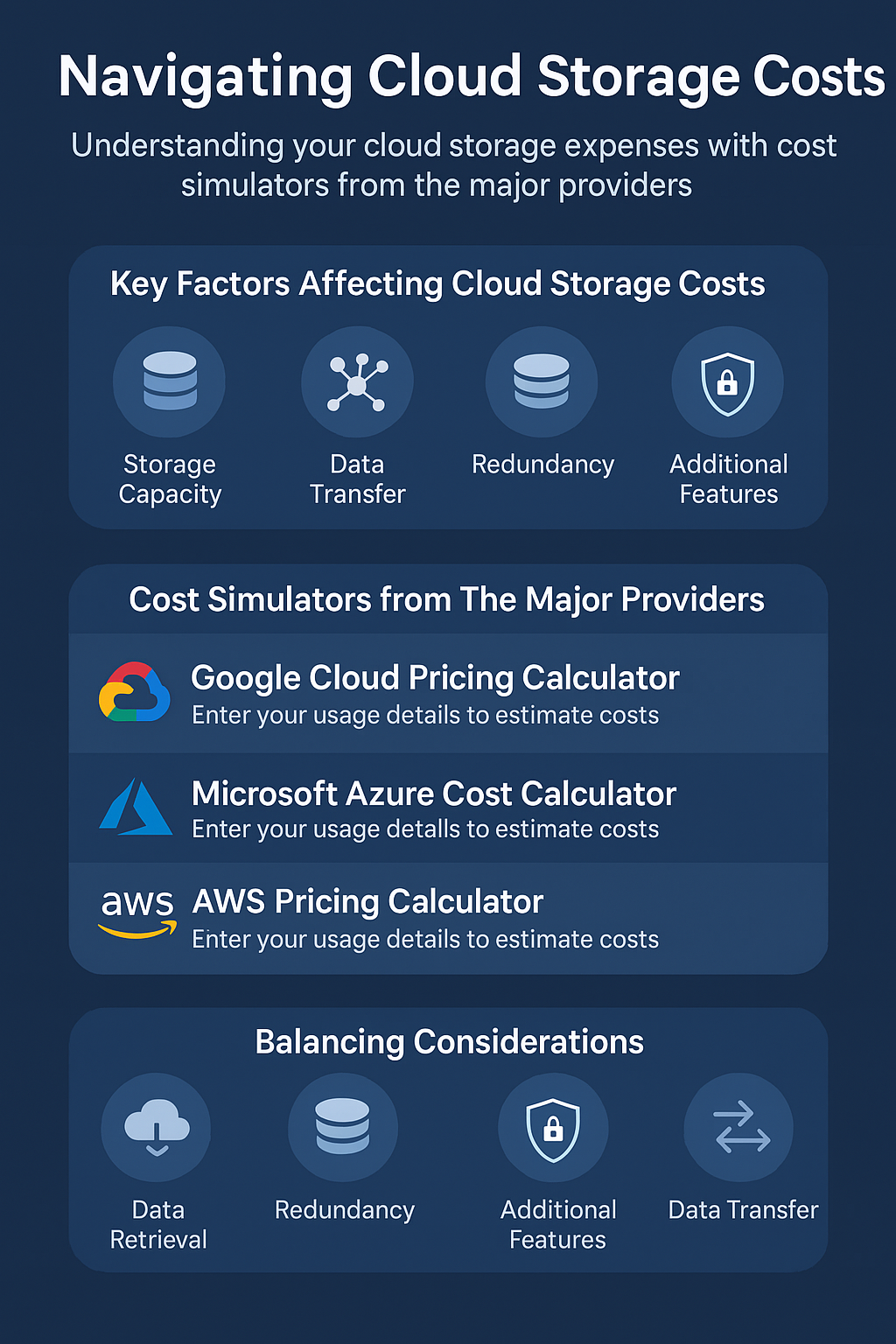Cloud Storage Cost Calculator: Compare Azure, AWS, and GCP Pricing
Looking to estimate your cloud storage costs across Azure, AWS, and GCP? Our cloud storage cost calculator makes it easy to compare providers and find the most cost-effective option for your data needs.
Why Cloud Storage Costs Matter
Cloud storage is an essential part of modern IT infrastructure. Whether you’re storing backups, hosting application data, or managing archives, understanding the total cost of cloud storage helps you budget smarter and avoid surprises.
Each cloud provider—Microsoft Azure, Amazon Web Services (AWS), and Google Cloud Platform (GCP)—uses a different pricing model. Costs depend on factors like:
- Storage capacity (how much data you store)
- Storage tier (e.g., Hot, Cool, Archive)
- Redundancy (e.g., LRS, GRS, ZRS)
- Data transfer and retrieval fees
- Additional features like encryption or versioning
Use Our Cloud Storage Calculator
Enter the amount of data you plan to store, then click “Compare Costs” to view a side-by-side breakdown for each vendor:
Note: This calculator focuses on storage costs only. It does not include data transfer or retrieval fees. Pricing may vary by region. Always verify directly on vendor websites.

Cloud Storage Pricing Breakdown
| Vendor | Tier | Redundancy | Price/GB |
|---|---|---|---|
| AWS | S3 Standard | Standard | $0.023 |
| S3 Infrequent Access | Standard | $0.0125 | |
| S3 One Zone-IA | One Zone | $0.01 | |
| Glacier | Standard | $0.004 | |
| Glacier Deep Archive | Standard | $0.00099 | |
| Azure | Blob Hot | LRS | $0.0184 |
| Blob Hot | GRS | $0.0368 | |
| Blob Cool | LRS | $0.01 | |
| Blob Cool | GRS | $0.02 | |
| Blob Archive | LRS | $0.00099 | |
| Blob Archive | GRS | $0.00198 | |
| GCP | Standard Regional | Regional | $0.02 |
| Nearline Regional | Regional | $0.01 | |
| Coldline Regional | Regional | $0.007 | |
| Archive Regional | Regional | $0.004 | |
| Standard Multi-Regional | Multi-Regional | $0.026 |
Frequently Asked Questions
What factors impact cloud storage costs?
Storage size, access frequency, redundancy level, and optional features like encryption or versioning.
Can I use this calculator for all three major providers?
Yes. This tool compares costs across Azure, AWS, and GCP.
Are archive tiers always the cheapest?
They are the lowest-cost options for rarely accessed data, but they incur retrieval fees and longer access times.
Is this calculator always up-to-date?
It reflects common pricing but may not be current. Always confirm directly with the cloud vendor for real-time rates.
Helpful Links
- Google Cloud Pricing Calculator
- Azure Pricing Calculator
- AWS Pricing Calculator
- GCP Storage Pricing
- Azure Storage Pricing
- AWS S3 Pricing
Azure Storage Unlocked
Send download link to:
Frequently Asked Questions
What factors most affect cloud storage cost?
Storage tier, redundancy, data retrieval frequency, and geographic location all contribute to pricing differences.
Which cloud provider is cheapest?
It depends on your usage. AWS Glacier and Azure Archive are typically lowest for long-term storage, but GCP may have better pricing for standard access in some regions.
How accurate are online cloud calculators?
They provide estimates. Real costs may vary depending on data access patterns, services used, and region-specific pricing.
Can I reduce cloud storage costs?
Yes — by choosing the right tier, using lifecycle policies, minimizing egress, and leveraging tools like Cloud Storage Manager.


